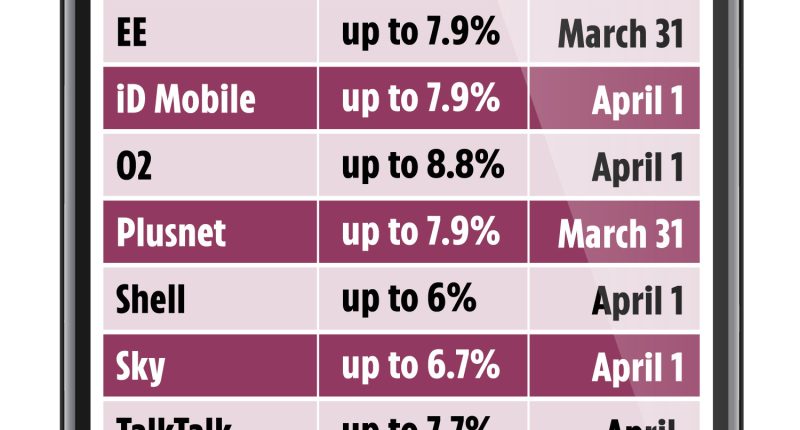MILLIONS of broadband, mobile and TV customers will be hit by huge bill hikes within weeks.
This is because telecom providers usually raise the prices of their contracts in the Spring.
Providers usually increase their prices annually based on the rate of inflation plus an extra 3.9%.
December’s CPI figure (4%) or January’s RPI figure (4.9%) are used by many mobile and broadband companies to hike prices.
The increases will come into effect for millions of customers on March 31 on April 1.
This means that the new rate will kick in from your next bill after that date.
Read more in money
The increase will affect customers even if they’re signed up to a contract with a fixed price.
This is because many firms have mid-contract price rises written into their terms and conditions.
The exact amount more you’ll have to pay will depend on how much your bill is now.
Providers could be banned from linking price rises to runaway inflation figures in the future under new proposals from Ofcom.
Most read in Money
The regulator said mobile and broadband customers were being hit with mid-contract rises, which they found difficult to understand.
Instead, providers are encouraged to spell out the exact amount in pounds and pence explicitly.
Below, we reveal how much prices will rise under 11 different providers in the Spring.
BT
BT, which has approximately 30million customers, has confirmed it will increase its prices for most BT broadband, landline, mobile and TV users.
These customers will see a rise of 7.9% – made up of December’s CPI figure plus 3.9%.
This will take place from March 31.
BT said: “Most of our customers can expect an increase of a few pounds per month, about the price of a takeaway coffee each month.”
From the summer, BT said it is abandoning mid-contract price rises linked to inflation, and will instead raise prices in pounds and pence.
BT consumer chief Marc Allera said mobile customers will see mid-contract price rises “from £1.50”, while broadband customers will face rises of “£3”.
EE
EE, owned by the BT group, will also hike prices for most of its 25million customers.
Each year, it adjusts the prices of its products and services in line with CPI plus 3.9%.
Most BT broadband, landline and mobile users will be affected.
It means its prices will increase by 7.9% from March 31.
Plusnet
Each year, Plusnet adjusts the prices of its products and services in line with December’s CPI figure plus 3.9%.
It means that broadband and landline customers who aren’t within the minimum term of a “fixed price contract” will see their bills rise by 7.9%.
But those within the minimum term of a “fixed price contract” will only see their call costs rise by 7.9%.
Shell
Shell adjusts the prices of its products and services in line with December’s CPI figure plus 2%.
It means broadband and landline customers who signed up before January 22, 2024, will see their bills rise by 6%.
Broadband and landline users who signed up on or from January 22, 2024, or users within the 12-month minimum term of a broadband or phone essentials tariff will not see their prices rise.
Sky Mobile
The majority of Sky Mobile’s phone tariffs have already increased.
On February 14, bills for Sky’s average out-of-contract mobile customer rose by 3%.
But from April 1, broadband and TV users, including Sky Stream and Sky Glass users will see their bills rise by 6.7% on average.
Home phone users will also see their calls per minute charge rise by 8% from 25p to 27p a minute.
TalkTalk
TalkTalk customers will also be paying more from April 1 this year.
Broadband and landline users will be paying a total of 7.7% extra.
This uses December’s CPI figure and an extra 3.7%.
Fixed Price Plus customers out of the minimum contract period will be paying 4% more – as this is based just on December’s inflation rate.
Three
Most of Three’s broadband and mobile users will be affected by price hikes.
The firm will be increasing costs by 7.9% from April 1.
A spokesperson for Three UK said: “This year, our contract customers whose bills will increase will see an average price increase of less than £1.50 per month.
“The increases reflect inflationary pressures we are facing as a business, including energy prices, supplier increases and increased staffing costs.
“Despite this change, our prices remain some of the most competitive in the market and we have a range of support, including a social tariff via SMARTY, available for customers struggling with their finances.”
Virgin Media 02
Virgin Media O2 also confirmed that its prices will be going up from April 1.
Most pay-monthly and sim-only users with mobiles or other gadgets will likely be affected.
The firm uses January’s retail price index of inflation plus 3.9% to determine its mid-contract price rises.
And with January’s retail price index at 4.9% it means millions will see their bills increase by 8.8%.
Virgin customers will see their bill increase by an average of £4.16 per month, or £49.92 a year.
A Big Bundle customer currently paying £31.99 a month, for example, will see their new bill rise to £34.81 – an increase of £2.82 a month, or less than 10p per day.
Meanwhile, O2 customers will see their bills rise, but the price increase will only apply to the airtime part of your bill.
This is what you pay for minutes, texts and data.
The increase will not be applied to device plans – what you pay for your handset.
O2 said this means the average price increase will be 5%.
But customers whose plans started before March 25, 2021 will see prices rise by RPI alone.
If you’re on a broadband and mobile social tariff, you won’t see an increase to your bills because Virgin Media O2 has frozen these tariffs.
Vodafone
From April 1, Vodafone will also increase its prices by 7.9% for half of its customers.
It says this will equate to a few pounds extra a month.
But the firm, which has over 18million customers, says it will continue to engage with Ofcom regarding changes to how mid-contract hikes are set out.
A spokesperson said: “We fully support providing clarity and choice for customers, and we will continue to engage with Ofcom as they finalise their plans.”
How much will my bill increase by?
Your internet provider or mobile network should contact you to let you know how much your bills will increase within the next couple of weeks.
If you’re a BT, EE, TalkTalk, Vodafone or Three customer, there’s an easy way to determine how much more you’ll pay in the Spring.
For example, to find out what 7.9% of your current monthly bill is – you can use an online percentage calculator.
Then add that to your current bill – this will give you your new monthly payment.
To determine your annual cost, multiply that total figure by 12.
How can I cut my telecom costs?
The simplest way to save more of your hard-earned cash is by switching your supplier when your contract expires.
If you’re outside the minimum term of your contract, then you won’t need to pay a cancellation fee – and you might be able to find a cheaper deal elsewhere.
You might be charged an exit fee if you’re still in your contract period.
But don’t just switch contracts because the price is lower than you currently pay.
Look at how much speed you need for broadband, how many minutes and texts you need, and how much data you’re using on your mobile to find out which deal is best for you.
Use comparison websites like MoneySupermarket and Uswitch to compare the best tariffs and phone prices.
If you’re happy with your provider, then it might be worth using your research to haggle a better deal, too.
The first thing to do is find out what the cheapest deal on the market is.
You can use this rate as a bargaining tool to get a better offer from your provider.
Get in contact with your provider to see if they can match this rate – if not, you might want to switch instead.
For more ways to cut your phone bill, we’ve got eight tips for slashing costs.
READ MORE SUN STORIES
Meanwhile, here is the full list of household bills set to rise by up to £370 in 2024 – and how to avoid paying more.
Plus, millions of people will see tax changes in 2024 that affect both their income and savings.










